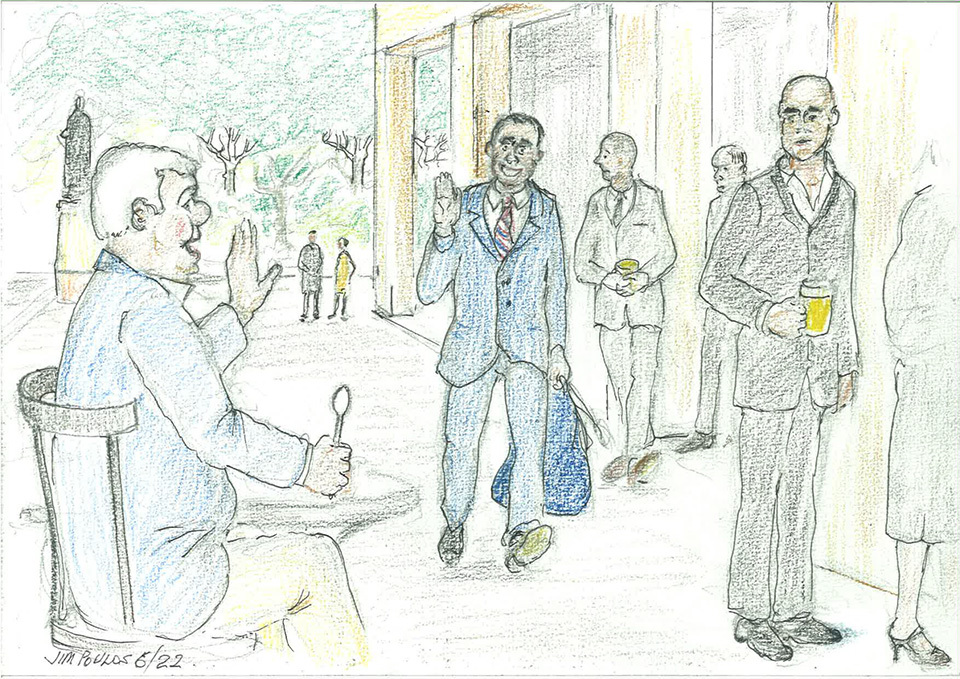- Winter 2022
- Bullyfry channels the analects of Jin Shengtan

1. A cooling latte with an old companion is very welcome
It is a hot day in early March – the new judicial term has started – the sun hangs still in the sky and there is not a whiff of wind in the air, nor a trace of clouds; the outdoor tables in front of Beanbah are hot like an oven. Perspiration flows down Jack Bullfry’s back in little rivulets, threatening to mar the purity of his old, cherished seersucker jacket. He is concerned that the chocolate liquorice from Haighs (purchased that morning to please his life companion) and nestled in his inside pocket is slowly liquefying. His customary noonday meal is before him (chicken curry and rice). He asks his favourite waitress for the umbrella to be moved slightly so that he is not so exposed to the brutality of the meridional sun.
He is looking around forlornly, hoping that some old companion will join him and relieve the tedium.
Just at this moment, he suddenly espies the Furtive Phoenician, immaculately clad as ever, meandering towards him up the street– he is one of Bullfry’s boon sussuratores – together they often rejoice in recalling together forgotten tribunals and deceased jurists, and discussing the humorous vicissitudes of practice. With him by his side, Bullfry can watch gleefully as the current team and their minions descend from behind the Supreme Court security fence (but how ‘secure’ is it?) and scurry to buy their lunch boxes, and take-away coffees.
‘My, my, how hard they work!’ thinks Bullfry with admiration – bound to a desk in an architecturally undistinguished building, bereft of assistance from the convoluted submissions of this morning’s callow junior, yet caught on the never-ending (the Sisyphean) curial treadmill – as one case is decided, another immediately takes its place. By contrast, Bullfry has little enough to do this afternoon except chat to his old friend and watch the passing parade– a complete ataraxia descends upon him. Ah, is this not happiness?
2. Judicial intervention as tempers rise
Bullfry is sitting at the back of the court waiting to be called – two counsel are engaged in a hot argument – they are calling each other ‘my learned friend’, and waiting to cut each other’s throats. Voices are raised and their faces flushed yet they still pretend to be ceremonious to each other, using the most polished language and wielding authorities with aplomb. The flow of words is interminable and some unpleasant ‘sledging’ begins to creep into the discourse. They are peremptorily called to order by the judge and meekly acknowledge their nascent misconduct. Ah, is this not happiness?
3. Finding an old textbook brings back long-forgotten memories
Bullfry is going through the bottom of his bookshelf in chambers. Hidden behind the CLRs (now only occasionally consulted) he finds a signed first-edition of a classic work on an abstruse aspect of constitutional law which once belonged to his old professor. The professor (long deceased) would lecture for two hours without a note and smoke two or three cigarettes each hour as he propounded the law. He followed the Socratic method he had learnt at Harvard Law School – by closely questioning a hapless student on the facts and principles of the case he would draw out all the twists and turns of the High Court’s reasoning. As he looked through the yellowing pages of the monograph, Bullfry found himself back in his youth in the law library – there he would sit happily in his favourite carrel, reading, and then making notes, on the contents of the buckram Appeal Cases carefully taken from the shelf; sometimes he would have fifteen or twenty volumes piled precariously by his side. (How different from the veritable flood of electronic cases now available daily in ‘medium neutral’ terms which no central authority could begin to collate and arrange according to importance).
As he read he was transported to that earlier, easier time when the jurists seemed more expert, rounded and sure-footed – T E Scrutton, four-time winner of the Yorke prize at Cambridge but never offered a Fellowship; infamous for never cutting his beard in his lifetime; expert on charterparties; doughty opponent of John Hamilton (Viscount Sumner) in any large mercantile dispute; exemplary in his jury direction on ‘system’ in the trial of George Joseph Smith in the Brides in the Bath Murders; famous for his unseemly dispute with Sir Henry McCardie in relation to the latter’s ‘bachelor’s knowledge’ of corsetry – they do not make them like that anymore.
Bullfry had realised then (and had never since forgotten) as he sat reading in the library that he was merely a tiny and inconsequential part of a continuum broadening down from precedent to precedent – Ah, is this not happiness?
4. A new smaller room becomes available on a congenial floor
Bullfry had long been looking for a new room in which to downsize but had not been able to find a suitable one. Suddenly, someone brings news that there is a room close by, not too big, but big enough for his table and books, and that it looks across St James to the Mint behind with the green trees of Hyde Park in the background. Bullfry asks this visitor to stay for lunch, and after the lunch they go over together to have a look, having no idea what the room is like. Entering the floor from the lift, Bullfry sees that there is a large conference area, a fully-fitted kitchen, and a well-maintained library, and he says to himself, ‘I shall not have to worry about where to hold larger conferences or mediations henceforth. I will be able to have lunch whenever I wish in tranquil surroundings with congenial colleagues’. Ah, is this not happiness?
5. A well-respected jurist calls it a day
There is an old tradition that when a lesser puisne jurist retires the senior silk present in court on the day of departure addresses all those present on behalf of the Bar. How much nicer is this studied informality than the rodomontade which is so often a feature of more formal matters in the Banco Court. Thus, Jack Bullfry to a packed courtroom:
Your Honour famously once said that there are only ten cases in the Equity Division and that you have heard each of them a hundred times! You have long displayed a legendary rigour of basic principle and courtesy to all who appeared in your court – your departure will be lamented by your colleagues on the Bench, the members of the Bar who argued before you and the litigants whose cases you have decided – we wish you and your wife well in retirement where your skills at petanque, macrame and contract bridge will come to the fore. We rejoice in the fact that you have eschewed any thought of developing a bespoke mediation practice and are turning again to reread the works of Trollope and Galsworthy which so often featured peripherally in your judgments. As you said recently, quoting Sir Owen Dixon when he left the High Court, 'I know very well what is worth reading in the Commonwealth Law Reports but still I am not going to take to reading them'. You will be able to spend a quiet afternoon in philoprogenitive excursion, visiting a grandchild, drinking a Malbec, and reading some Swinburne – you will be able to say with Jin Shengtan: Ah, is this not happiness? BN

